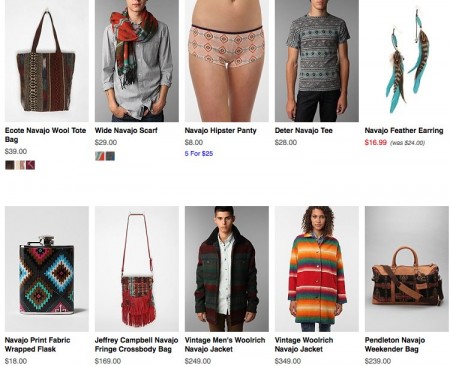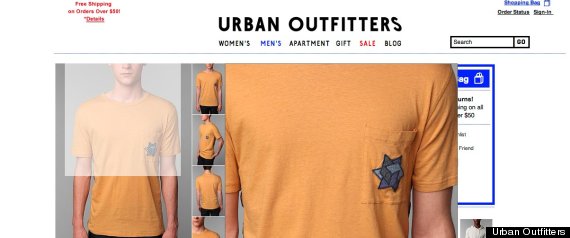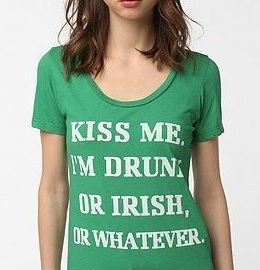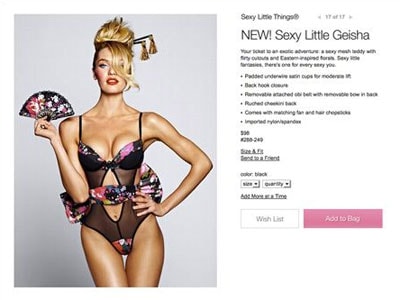Welcome to College Fashion’s biweekly column, Fashionably Informed. As a CF reader, it’s clear that you love fashion. But have you ever wondered about the drama that goes on behind the scenes? To keep you up to speed, this column aims to inform you about important issues and controversies in the fashion industry.
In case you missed them, see past posts on Retouching & Photoshopping, Tanning Promotion in the Media, Hypocrisy in Beauty Marketing, Racism in the Modeling Industry, “White-Washing” & Skin Lightening, and Homosexuality in the Fashion Industry.

Urban Outfitters’ “Navajo”-Inspired Clothing Line | Photo Credit
For this week’s post, we are returning to our series on racism in the fashion industry. Over the past few months, we have discussed Racism in the Modeling Industry and “White-Washing” & Skin Lightening. This time, we are tackling a slightly different topic: cultural appropriation andstereotyping of culture and ethnicity in retail fashion.
This topic idea was derived from a suggestion by CF reader Amanda. She commented on the last article in our series on racism, saying:
I would be interested in seeing an article on the appropriation of other cultures in the fashion industry. Especially prominent right now is the appropriation of Native American and Asian cultures. Anyway, thanks again!
Thank you, Amanda, for your excellent suggestion. Just last week, media outlets went wild about Victoria’s Secret’s “Sexy Little Geisha” costume,but we will get to the topic later in this post.
The Victoria’s Secret controversy is just one example among many: Numerous retailers have offended consumers by portraying races and cultures in stereotypical and negative ways, or trivializing cultures by turning them into “trends.” Native American and Asian cultures are perhaps appropriated and stereotyped the most in the US, however this issue affects a wide range of cultural groups.
Given that today is both Columbus Day and Indigenous People’s Day, it’s an ideal time to raise awareness about the topic, in hopes that we can all recognize these acts when they occur and work together to change the way cultures are portrayed in fashion.
While stereotyping and appropriation happen across the industry – in magazines and ads, and on the runways – today, we’re going to focus on controversies surrounding popular retail stores.
Table of Contents
First, a Few Definitions
Before we get started, let’s define a few terms so we’re all on the same page.
According to Wikipedia, “cultural appropriation” is defined as follows:
Cultural appropriation is the adoption of some specific elements of one culture by a different cultural group. It describes acculturation or assimilation, but can imply a negative view towards acculturation from a minority culture by a dominant culture. It can include the introduction of forms of dress or personal adornment, music and art, religion, language, or social behavior. These elements, once removed from their indigenous cultural contexts, can take on meanings that are significantly divergent from, or merely less nuanced than, those they originally held.
When we refer to “stereotypes,” we are using the following definition, again from Wikipedia. (Note the differences between stereotypes, prejudices, and discrimination):
Stereotypes, prejudice and discrimination are understood as related but different concepts. Stereotypes are regarded as the most cognitive component, prejudice as the affective and discrimination as the behavioral component of prejudicial reactions. In this tripartite view of intergroup attitudes, stereotypes reflect expectations and beliefs about the characteristics of members of groups perceived as different from one’s own, prejudice represents the emotional response, and discrimination refers to actions.
Although related, the three concepts can exist independently of each other. According to Daniel Katz and Kenneth Braly, stereotyping leads to racial prejudice when people emotionally react to the name of a group, ascribe characteristics to members of that group, and then evaluate those characteristics.
Now that we all understand what these terms mean, let’s talk about some recent examples of appropriation and stereotyping in retail fashion. Below, I’ll lay out a few different incidents affecting a number of cultural groups.
Urban Outfitters
Urban Outfitters has been accused several times of portraying cultures in a negative or inappropriate manner. Each time, they have stated that they had no intention of offending anyone. In many cases, UO has ended up removing the offending items from stores.
“Navajo” Clothing Line
About a year ago, Urban Outfitters came under fire for their “Navajo”-inspired clothing line. The fashion retailer featured several designs that they labeled as “Navajo” (see top photo above). These included a “Navajo Hipster Panty” and a “Navajo Print Fabric Wrapped Flask.”
While numerous people found these items offensive, perhaps no one was more insulted than the Navajo National Government. They were firstly offended by the portrayal of their culture as a mere fashion trend. However, an additional problem was that these “trendy” items were labeled “Navajo”.
According to The Globe and Mail, the Navajo National Government “holds a dozen trademarks on the name, encompassing clothing, textiles, household products and other items.” Consequently, the Navajo Nation Government sent a cease-and-desist letter to Urban Outfitters, demanding that they remove the trademarked name from the items in question.
In a statement to the Associated Press, the tribe’s attorney said,
“When products that have absolutely no connection to the Navajo Nation, its entities, its people, and their products are marketed and retailed under the guise that they are Navajo in origin, the Navajo Nation does not regard this as benign or trivial. It takes appropriate action to maintain distinctiveness and clarity of valid name association in the market and society.”
Along with the Navajo National Government, numerous Native Americans across the country were deeply offended. On the news blog, Racialicious, guest contributor Sasha Houston Brown wrote an open letter to Urban Outfitters’ CEO. In it, she said,
In all seriousness, as a Native American woman, I am deeply distressed by your company’s mass marketed collection of distasteful and racially demeaning apparel and décor. I take personal offense to the blatant racism and perverted cultural appropriation your store features this season as “fashion.”
In response to the demands of the Navajo National Government and other offended individuals, Urban Outfitters told the Associated Press,
“Like many other fashion brands, we interpret trends and will continue to do so for years to come. The Native American-inspired trend and specifically the term ‘Navajo’ have been cycling through fashion, fine art and design for the last few years.”
While Urban Outfitters denied any wrongdoing in their statement, they subsequently removed the word “Navajo” from the products in question. The Hufington Post reported that the offensive items were renamed.
Despite Urban Outfitters’ actions to re-name the products, according to The Guardian, the Navajo Government filed a lawsuit against the company. The fashion retailer removed the “Navajo” name from the products on their website – however, the lawsuit asserted that the names remained in other places. The Guardian explains:
But the lawsuit claims that products with the Navajo name were still being sold through other company brands, such as Free People, in catalogues and retail outlets.
The lawsuit is still ongoing, as is the controversy.
“Jewish Star” T-Shirt

Urban Outfitters’ shirt featuring “Jewish Star” | Photo Credit
Earlier this year, Urban Outfitters featured a shirt on their website that deeply insulted the Jewish community and others. The problem was that the shirt (pictured directly above) had a patch on its pocket that bore a strong resemblance to the Star of David, which Jewish individuals were forced to wear during the Holocaust.
The Huffington Post reported that the star outraged the Anti-Defamation League (ADL) of Philadelphia. In their statement about the controversy, ADL’s regional director wrote,
We find this use of symbolism to be extremely distasteful and offensive, and are outraged that your company would make this product available to your customers.
The shirt was deemed offensive due to the Star of David’s connection to the Holocaust and Nazism. However, the brand, WoodWood, who produced the shirt, denied any intentional representation of the Holocaust. In response to ADL’s statement, WoodWood stated the following:
First of all the graphic is not the Star of David, and I can assure you that this is in no way a reference to Judaism, Nazism or the holocaust. The graphic came from working with patchwork and geometric patterns for our spring/summer collection ‘State of Mind’. However when we received the prototype of this particular style we did recognize the resemblance, which is why we decided not to include the star patch on the final production T-shirt. I assume the image people have reacted to come from Urban Outfitters´ web site. This must be a photograph of an early sample, which is of course an error. Here is the actual T-shirt as it is in stores. I am sorry if anyone was offended seeing the shirt, it was of course never our intention to hurt any feelings with this.
As you can see from the statement, WoodWood denied that the star was a reference to Judaism, but also claimed that the shirt published on Urban Outfitters’ site was an early sample of the t-shirt. To WoodWood’s credit, the final product did not include the star in any way.
However, this was not the only time Urban Outfitters offended members of the Jewish community. According to the ADL, UO produced another shirt that many found offensive. This shirt included the phrase, “Everyone Loves a Jewish Girl,” surrounded by dollar signs. After a largely negative response, UO pulled the shirt.
St. Patrick’s Day Collection

Urban Outfitters’ St. Patrick’s Day T-Shirt
Urban Outfitters also came under fire for their portrayal of the Irish community, specifically because of their St. Patrick’s day mechandise. The fashion retailer was accused of supporting negative stereotypes of Irish and Irish-Americans. The offending collection included tanks and t-shirts with sayings such as “Kiss Me. I’m Drunk, or Irish, or Whatever.” (pictured above) and “Irish I was Drunk.”
Members of the Irish community demanded that Urban Outfitters pull the items, which they deemed offensive. According to Politicker, Joe Crowley, the co-chair of the legislature’s Ad Hoc Committee on Irish Affairs, wrote a letter to the company’s CEO demanding the products be removed. In his letter, Crowley explains the effects of the clothing items:
We recently learned of images used by Urban Outfitters in its St. Patrick’s Day clothing line that depict severe and negative stereotypes of Irish and Irish-American people as well as may promote binge drinking. We strongly urge you to end the sale of these items.
Urban Outfitters has not responded to this controversy.
Abercrombie and Fitch
Of course, Urban Outfitters is not the only brand to come under fire for their portrayals of cultural groups. Abercrombie and Fitch caused outrage when they began selling t-shirts that featured what some deemed a stereotypical portrayal of Asian individuals and culture.The San Francisco Chronicle reported that the shirts featured “caricatured faces with slanted eyes and rice-paddy hats.” One of the shirts also included the phrase, “Wong Brothers Laundry Service — Two Wongs Can Make It White.”
Abercrombie’s representation of Asian culture, to many, demonstrated the historic stereotypes often placed on the Asian community. This stereotypical representation outraged numerous people and many demanded the removal of these shirts. Despite the negative response, a spokesperson from Abercrombie’s PR firm told the SF Chronicle,
“We personally thought Asians would love this T-shirt. We are truly and deeply sorry we’ve offended people”
In a follow-up article, The SF Chronicle reported that after protests and threats of boycotts, Abercrombie and Fitch removed the shirts from their stores and website.
Victoria’s Secret and the “Sexy Little Geisha”

Victoria’s Secret “Sexy Little Geisha” Costume | Photo Credit
Last week, numerous media outlets reported about the controversy surrounding Victoria’s Secret “Sexy Little Geisha” costume (pictured above). The costume includes a sheer and floral printed body suit, a fan, and chopsticks meant for your hair. The lingerie company was accused by many blogs and news sites of perpetuating stereotypes of Asian women by selling this costume.
Racialicious cited the important historical context that surrounds this costume and the idea it represents. They stated,
Donning a “sexy Geisha” outfit to get the ball rolling in the bedroom remains offensive because it confirms a paradigm in which Asian people and their culture can be modified and sexualized and appropriated for the benefit of the West. This particular kind of racism has existed for a long time, and we’re far from moving beyond it.
The Frisky also refered to the long-standing stereotype of the “sexualized” Asian woman, saying,
It’s an entire outfit — a sex costume, really — based on the accoutrements of the Japanese geisha to make your lingerie “exotic” and signify the sexual submission and exploitation of Asian women.
Numerous other blogs and articles echoed Racialicious and The Frisky’s comments about the controversy. While the representation of the stereotype of Asian women as hyper-sexualized and submissive caused outrage, many were also upset by the use of the term “Geisha.” The Frisky pointed out the not-so-glamous past of geishas,
Considering the complicated history of geishas, repurposing the “look” for a major corporation to sell as role-playing lingerie seems a bit tasteless.
Due to the negative response, Victoria’s Secret has removed the costume from their website. As of this article’s publication, Victoria’s Secret has yet to release a statement regarding the controversy.
More Information
As this issue is incredibly multifaceted, it would be impossible to adequately explain it all in one post. For more information on cultural appropriation and stereotyping as it relates to all forms of fashion, we recommend the following web resources:
- Cultural Etiquette: A Guide for the Well-Intentioned, an essay by Amoja Three-Rivers, is a guide to the complex issue of cultural appropriation, and how to celebrate cultures you find beautiful in a respectful way.
- But What if I Want to Wear Indigenous Jewelry?, from Selchie Productions, explains the dos and don’ts of buying and wearing indigenous pieces.
- “We’re a culture, not a costume” this Halloween, from CNN, discusses cultural appropriation and stereotyping in Halloween costumes.
- Racialicious’ “Fashion” section is an excellent resource for in-depth info on all of the above controversies, plus many more.
What do you think?
What do you think about these incidents? Are you offended by the portrayal of certain cultures in stores? Have you noticed similar incidents of stereotyping? What do you think of the companies and brands’ responses to these controversies?
Would you like to see a follow-up post on this topic? If so, what incidents would you like to see covered?
Tell us your thoughts by leaving a comment.

I’m really glad you brought up this post. It definitely got my thinking about my own description of clothing and all the different cultural implications of this kind of clothing.
I don’t really see a problem with any of this – all these designers are doing is taking inspiration from other cultures. Somebody above mentioned they thought the designers were being “disrespectful”; I disagree. If VS wants to make a “sexy geisha” costume I don’t care any more than I would if they stereotyped my (American) culture and sold a “sexy puritain outfit” (not sure how sexy that would be, though!). People get offended waaaaay too easily these days.
[By the way, if anyone is interested in geishas or just wants to watch a really great movie, “Memoirs of a Geisha” is one of the best. movies. ever…..it’s like a Cinderella story and artistically it’s also very beautiful. If you haven’t seen it, rent it now]
I don’t really think any of the brands did anything wrong… Well, maybe Victoria’s Secret with “Sexy little Geisha”, but that’s because Geishas’s position is often misunderstood (contrary to popular belief, they didn’t sell their bodies, they just entartained men WITHOUT any kind of sex).
But as for the Navajo stuff, the Jewish star, the Irish t-shirt… c’mon people. A little bit of sense of humour won’t do any hurt.
My town’s kind of famous around here for our driking habits, and I don’t think that’s a reason to get offended. Stereotypes do exist. As long as we don’t entirely believe them, where’s the problem with these clothes?
On a personal level, I did not find any of these examples grossly offensive, though the Geisha outfit drew an instinctive eye-roll out of me, I think people should definitely be careful before saying things like”people are way too sensitive” or ”people need to have a sense of humour”.
Minority communities in many countries have had a history of being stereotyped, persecuted and marginalized for decades and in some countries, that is still the case today. I think the fact that certain people find products assigned to a particular ethnic group offensive is often linked to their past experiences or the experiences of their communities which in many cases could have been very painful.
I think it is okay to not find some or any of these products offensive, but if other people, given their own experiences and sensitivities are offended by them, who are we to say ‘people are way to sensitive’ and ‘people need to get a sense of humor’?
I am very concerned about some of the comments here. “People get offended too easily” and “it’s just fashion” are dangerous ideas. Whatever happened to courtesy and respect towards all cultures? What happened to being aware of the power plays between whites and non-whites, Westerners and non-Westerners, or just dominant and non-dominant groups in general?
Something that is apparent to me while reading these comments is that some CF readers don’t seem to realize that the United States has historically marginalized many races, ethnic groups, and cultures, and it is the system of oppression against these people and the stereotyping of their culture from our American perspective that makes cultural appropriation completely disrespectful and wrong.
I understand where people are coming from but people seem to take offense from the littlest things nowadays.
That “sexy little geisha” outfit.. I mean, come on, it’s just because it refers to a different culture that it might be seen as “wrong”. I don’t see nurses complaining because their workwear is interpreted in “sexy” ways.
However, the shirt with the star of David is just terrible, but that’s because of the entire gruesome connotation it still holds. (Especially here in Western Europe)
Political correctness is being blown out of proportion lately, people shouldn’t take offense so easily.
99,9% of the time that something like this happens, they really don’t mean to harm others.
People have become so focused on “Am I being disrespected?” that they don’t realise that they are distancing themselves from others by profiling themselves as so inherently different.
In the end: Who gives? Is your life so much different if you feel like a certain store is saying something you don’t like? Why don’t people make such a fuss about political things that REALLY matter, that could save lives?
Because we’re SELFISH and we only care about ourselves, because we are great and if anyone thinks otherwise we’re going to sue them! Because we can! Hurray for freedom of speech!
College Fashion, why can’t you just lighten up? The fact that Americans have historically marginalized different racial and ethnic groups has nothing to do with the fact that now American fashion is stereotyping them and making them homogenous! I wouldn’t care if VS made a “slutty white girl” costume!
But seriously, great article. A lot of people aren’t aware of cultural appropriation or the dangers of it, and I think a lot of the comments prove that.
Wow. I cannot believe that there are people who want to argue this with “well I wouldn’t be offended by WHITE stereotyping in clothing”… I realize you’re not personally offended, but that’s not really the point.
I understand that it’s really hard to see someone else’s perspective, but people need to be willing the be thoughtful in their daily actions. Cultural appropriation is all about cultures which are marginalized here in the west. We as white people don’t get to say that “we wouldn’t find this offensive, so they shouldn’t either!” Because we’ve never had to be in that position! Sure, there are white ‘stereotypes’ but it’s not the same as racism and actual marginalization. To equate the two does a huge disservice to people who have experienced true racism; people who have actually felt hurt when they see their own culture turned over into a silly costume used to turn profit for a bunch of rich white business owners.
As a white girl, I have the sense to know that I’m not offended personally, because I’ve had the luxury of never having to experience anything like this in western culture in which my race has the most power socially. I can’t tell someone who is upset by cultural appropriation that they should ‘stop being so sensitive’. That would be cruel, and ignorant, and only speak to my unwillingness to appreciate another person’s experience. So please. If you don’t think this is an issue, just walk away. But don’t say that, as a white person, you don’t find cultural appropriation to be offensive. …You’re just kind of proving the point against it.
yeah…i don’t see how this is a big deal really. I can see how some people would be offended though.
I personally would never wear anything like this, but in America, we are free to wear what we want. If someone wants to dress like a sexy geisha, go ahead and let them. Who cares what people wear in the bedroom anyway? Does dressing like a sexy school girl means you are into pedophilia? No. Calm down people. Jeez.
To be honest, everyone who says they don’t think this is a “big deal” is precisely why this article has to be posted. Just because you don’t think it is a big deal does not mean that this sort of approach to culturally sensitive matters (aka, pretending they don’t matter) doesn’t reinforce the very oppression that people from these cultures experience.
“It’s just fashion” is like saying “it’s just a TV show” or “it’s just a book” or “it’s just a word.” At the end of the day, nothing is JUST. We don’t live in a vaccuum. We live in a world where things are connected and have very real, very serious consequences for those who are not in power positions.
I personally think its just clothes and people should be being offended over every little thing…
@ Emily, very well said.